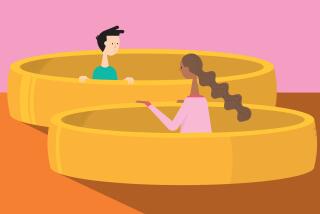When AIDS Testing Takes a Spot in the Wedding Plans
- Share via
With the announcement that AIDS tests may become mandatory for those seeking marriage licenses, the disease has finally found an official niche in the heterosexual mating game.
I decided to take the test to resolve the issue between myself and the woman I hope to marry, both because she was concerned and because not knowing had, for me, become intolerable.
Here are the facts: I am 27 years old, healthy, and I have had four lovers in the last five years, including the woman I’m involved with now. She’s a regular blood donor, so I knew that she was probably clear, even taking into consideration the three-month gestation period before positive results may show up.
Two of the three remaining women were extremely low-risk. One had had few lovers in her entire life, the other is (with rare exceptions) a lesbian--one of God’s chosen people, if the spread of AIDS is any indication. The third woman, my previous long-term lover, was a question mark. Had she been faithful?
On Wednesday I got the name of a clinic in Hollywood from a gay friend. The clinic identifies its clients by a two-letter/two-number code rather than a name, and requires you to return in person for the results--positive or negative. The test was free, but the soonest appointment was three weeks away. I couldn’t wait.
A nurse at my doctor’s office referred me directly to the lab that they use, where a breezy, funny technician took my blood and told me that I’d probably get the results on Friday--but, if not then, definitely by Monday. They would call me, and would bill the $52 fee direct to Blue Cross.
And I thought: If this test is positive, who cares if my insurance pays for it?
Welcome to the mind-set of waiting for the results of a test for exposure to HIV (human immunodeficiency virus, the new catch-all name for HTLV-III and its relatives), which, if positive, means that you have about a 30% chance of actually getting AIDS. Which in turn means that you have a 100% chance of dying in the relatively near future.
As I drove home it occurred to me that infidelity, whether in marriage or relationships, is not just an emotional issue anymore. The unfaithful partner may be making lethal choices on behalf of both people. I felt like strangling my previous lover.
First came nihilism: It’s been a good life; if the test is positive, I’ll just end it. But what about this woman I’m so in love with? Do I stay alive to take care of her in case she comes down with it and I don’t?
Then bargaining: Protect her, God. Let me live, and I’ll take more responsibility for my life. I’ll try to change the world.
Then a terrible thought: If the test is negative, I’ll stay with her forever. There doesn’t need to be any love in that thought. AIDS makes anyone who is known to be past the gestation period a rare, maybe an irreplaceable, find.
Friday came and went without a phone call. It was a long, long weekend.
On Monday morning, for some reason, I felt grimly prepared. I went to work, and fitfully put the test out of my mind. I thought: If they call, and it’s negative, they’ll just tell me. If it’s positive, they’ll tell me to come into the office to get the results. By 11:27 a.m. I couldn’t stand it any longer. I called the doctor’s office, got the same cheerful nurse: “Oh, are you calling about your test? It was negative.” I thanked her politely, and hung up.
Why didn’t she call when she got the results? Why no counseling, no secrecy, no concern? Why? Because I’m heterosexual. The first time they get a positive result, this non-system will change.
When I told my lover that I’d taken the test and that it was negative, she was a little confused. Why hadn’t I told her that I’d taken the test? Had I been afraid that I might have AIDS? She had to think about it for the rest of the day before she left a message that she appreciated my doing it. And then another: that she loved me very, very much.
My gay friend said that his community has had to mature rapidly in the last five years, not only learning to take responsibility for sexual behavior but also having to deal with the reality of death and the necessity of caring for the sick and dying.
We heterosexuals will have to learn those same lessons whether or not we choose to benefit from the experience of those who have gone before. Even more than my marriage, now I think about my kids and what kind of choices will be left to them.


